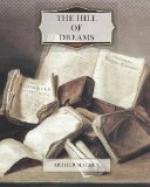In the curious silence which followed the last notes, when the boy and girl had passed under the purple ilex shadow, he fell into a reverie. The fancy that sensations are symbols and not realities hovered in his mind, and led him to speculate as to whether they could not actually be transmuted one into another. It was possible, he thought, that a whole continent of knowledge had been undiscovered; the energies of men having been expended in unimportant and foolish directions. Modern ingenuity had been employed on such trifles as locomotive engines, electric cables, and cantilever bridges; on elaborate devices for bringing uninteresting people nearer together; the ancients had been almost as foolish, because they had mistaken the symbol for the thing signified. It was not the material banquet which really mattered, but the thought of it; it was almost as futile to eat and take emetics and eat again as to invent telephones and high-pressure boilers. As for some other ancient methods of enjoying life, one might as well set oneself to improve calico printing at once.
“Only in the garden of Avallaunius,” said Lucian to himself, “is the true and exquisite science to be found.”
He could imagine a man who was able to live in one sense while he pleased; to whom, for example, every impression of touch, taste, hearing, or seeing should be translated into odor; who at the desired kiss should be ravished with the scent of dark violets, to whom music should be the perfume of a rose-garden at dawn.




